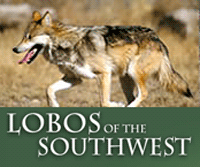For immediate release October 28, 2021
Media contacts:
Michelle Lute, Project Coyote (406) 848-4910; This email address is being protected from spambots. You need JavaScript enabled to view it.
Emily Renn, Grand Canyon Wolf Recovery Project (928) 202-1325; This email address is being protected from spambots. You need JavaScript enabled to view it.
Erin Hunt, Lobos of the Southwest (928) 421-0187; This email address is being protected from spambots. You need JavaScript enabled to view it.
PROPOSED USFWS MEXICAN GRAY WOLF MANAGEMENT RULE STILL INADEQUATE TO RECOVER SPECIES
ALBUQUERQUE, N.M. — Yesterday, the U.S. Fish and Wildlife Service (USFWS) released an advance copy of a court-ordered revision to the rule guiding Endangered Species Act recovery for the Mexican gray wolf that fails to safeguard these wolves per conservation groups and the recommendations of leading wolf scientists in two key ways.
First, the rule fails to expand the arbitrary and politically motivated geographic boundaries, bounded by interstates and defined by livestock interests, which fail to account for wolf habitat. Second, it continues to support an antiquated, 22-year-old decision that the entire U.S. wild Mexican gray wolf population is “non-essential” to recovery.
Yesterday’s proposed rule responds to a court order from 2018 in which the judge wrote, “By failing to provide for the population’s genetic health, [the Fish and Wildlife Service] has actively imperiled the long-term viability of the species in the wild.” Further, the judge stated the rule only ensures the short-term survival of the species and specifically called out the [2015] rule’s territory boundary as an “insufficient geographic range” for the wolves.
“The USFWS was handed a golden opportunity in the court order to make significant improvements to further the conservation of Mexican gray wolves,” said Emily Renn, executive director of the Grand Canyon Wolf Recovery Project. “By not addressing the I-40 boundary issue, the agencies involved continue to tie their own hands, delay, and hinder the recovery of these critically endangered wolves in places where people will actually welcome them.”
“The Service continues to treat lobos like a zoo exhibit: Scientists call for more habitat, conservationists sue the Service, and the Service expands the boundaries and claims the wolves don’t need more room. Only this time the Service kept in place the old boundary and still will trap and remove — possibly injuring or killing — any wolf who can’t read a map,” said Peter and Jean Ossorio, lobo supporters since 1998.
The U.S. Fish and Wildlife Service could have used this revision as an opportunity to expand the geographic scope of the recovery area to include suitable habitat for Mexican wolves north of Interstate 40. Conservationists continue to call for expansion of the recovery area and an end to limiting the recovery of this rare species based on political desires to restrict where wolves can roam.
“At a time when we are losing species to extinction at an alarming rate, we cannot afford to gamble with the lives and futures of Mexican gray wolves,” said Erin Hunt, coordinator for Lobos of the Southwest. “We nearly lost them to extinction once already. We need to designate them as essential, giving them the full protection of the Endangered Species Act.”
Groups applauded some aspects of the proposed rule, describing them as small improvements over the 2015 plan, including preventing “take” by state fish and game departments concerned about wolf impacts on deer and elk populations.
“Although there are a few bright spots in this proposed rule, it fails to include evidence-based best practices to prevent conflict and promote conservation,” said Michelle Lute, PhD in human-wolf coexistence and national carnivore conservation manager for Project Coyote. “Proactive actions like releasing bonded mates with pups and reforming livestock husbandry practices are essential to recovery of this essential lobo population.”
The USFWS proposal is expected to be published to the Federal Register (docket # FWS–R2–ES–2021–0103) on Friday, Oct. 29, at which point the public will have 90 days to review and comment on the proposal. USFWS will hold a virtual information session on Nov. 18 to answer questions. Two additional virtual information sessions, followed by public hearings with comment opportunities, are on Dec. 8 and Jan. 11.
Concerned citizens can read the proposed rule and register for the sessions and hearings on the USFWS website.
###





